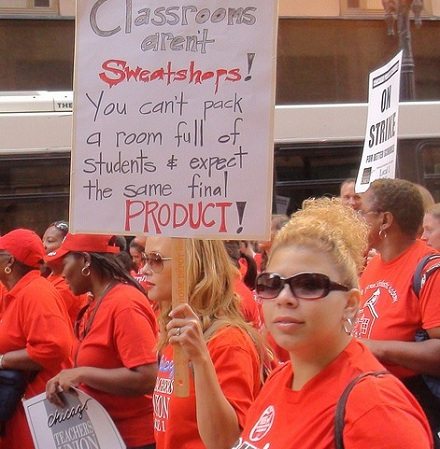
September 13, 2012; Source: New York Times
26,000 Chicago public school teachers have been on strike since Monday afternoon and now talks are reportedly progressing in a positive direction, with a potential resolution to come by Monday. The union’s main requests are:
Sign up for our free newsletters
Subscribe to NPQ's newsletters to have our top stories delivered directly to your inbox.
By signing up, you agree to our privacy policy and terms of use, and to receive messages from NPQ and our partners.
- Smaller class sizes;
- More playgrounds, recess time and physical education classes;
- More art, dance, theater, music and foreign language instruction;
- More funding for libraries;
- Healthier school lunches;
- An end to the “apartheid-like” Chicago Public School system today and to “discipline policies with a disproportionate harm on students of color;”
- Guaranteed pre-K and full-day kindergarten for all students;
- Higher teacher salaries and more teacher “autonomy;”
- Better bilingual and special needs programs; and
- Higher-quality school facilities.
The New York Times reports that, in a negotiation Wednesday, both union and public officials left feeling positive that an agreement would be reached soon. Chicago Teachers’ Union President Karen Lewis said they “shared a lot of back-and-forth and what really needs to get done to solve those most difficult issues.”
Critics, like the New York Times’ Nicholas Kristof, have argued that the Chicago teachers are placing their own concerns, such as seeking to “protect weak perform[ing]” teachers, over the well being of the school district’s children, 87 percent of whom, Kristof writes, come from low income families. Other sources, like the Progressive’s Matthew Rothschild, counter that the Chicago teachers are rightfully standing up for students with demands such as smaller classes and better classrooms and “by opposing rote teaching to the test.”
No matter what side you come down on, the strike has certainly brought to head nationwide debate on many education topics including new teacher evaluation systems, what quality schools look like, and how much one can trace student success to his or her teacher. The strike is widely seen as perhaps setting an important precedent for teachers’ unions across the country. –Kristin Barrali













